Emery Williams Jr
b. October 26th, 1931 in Haynes (Arkansas)
d. August 9th, 2005 in Chicago (Illinois)
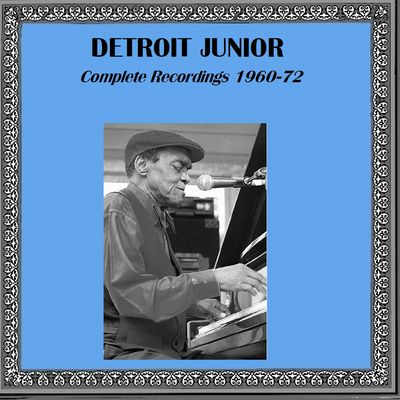
COMPLETE EARLY RECORDINGS
Blue Eye blog (mp3)
February 1960 - December 1971
Originaire de l'Arkansas, il émigre dans la région au nord de Detroit (Pontiac, Flint). Il y démarre professionnellement sous le parrainnage d'Eddie Boyd qui l'incite à rejoindre Chicago en 1956. Il semble rencontrer également Amos Milburn, le pianiste de R&B, une de ses premières influences. Dans la cité des vents, il se lie d'amitié avec Boyd, Little Mack Simmons, Lefty Dizz. Apparemment, ce serait Narvel "Cadillac Baby" Eatmon, le patron du label Bea & Baby, qui l'aurait affublé du pseudonyme de Detroit Junior (avant, il se faisait appeler Little Junior Williams). Chez Bea & Baby, il ne grave qu'un seul simple en 1960 : "Money tree" et "So unhappy". Après l'épisode Bea & Baby, Detroit Junior grave aussi pour des labels comme Chess ("Too poor" et l'excellent "You mean everything to me"), Foxy, Palos et CJ ("Mother in law blues", "Don't unpack"). Mais, Detroit Junior aura plus de chance chez USA Records ou il propose une poignée de simples sous la supervision du producteur Al Perkins. Il alterne purs morceaux de Chicago blues (son célèbre "Call my job" avec la guitare de Lonnie Brooks et le sensible "The way I feel") et des titres d'inspiration plus R&B dans la lignée d'Amos Milburn où il bénéficie des arrangements de Burgess Gardner ("All through with love"). Cette sélection rassemblée par Gérard Herzhaft inclut également le LP "Chicago urban blues" (voir ci-dessous).
Originally from Arkansas, he emigrated in the north of Detroit (Pontiac, Flint). He started professionally under Eddie Boyd supervision who encouraged him to move to Chicago in 1956. He seems also meet Amos Milburn, R&B pianist, one of his early influences. In Chicago, he befriended Boyd, Little Mack Simmons, Lefty Dizz. Apparently, it would be Narvel "Cadillac Baby" Eatmon, Bea & Baby label owner, which would nicknamed him Detroit Junior (before, he was called Little Junior Williams). At Bea & Baby, he cut just one single in 1960 : "Money tree" and "So unhappy". After Bea & Baby, Detroit Junior records for labels such as Chess ("Too poor" and the excellent "You mean everything to me"), Foxy, Palos and CJ ("Mother in law blues", "Don't unpack"). But Detroit Junior is luckier with USA Records where he cuts a handful of singles under the supervision of producer Al Perkins. He alternates tracks of pure Chicago blues (his famous "Call my job" with Lonnie Brooks on guitar and the sensitive "The way I feel") and more R&B inspired songs in the Amos Milburn style with arrangements by Burgess Gardner ("All through with love"). This selection collected by Gérard Herzhaft also includes the "Chicago urban blues" LP (see below).
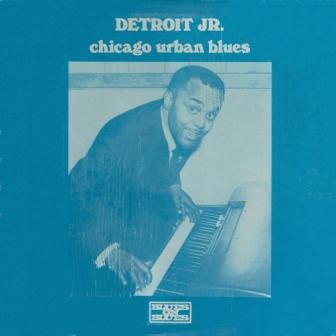
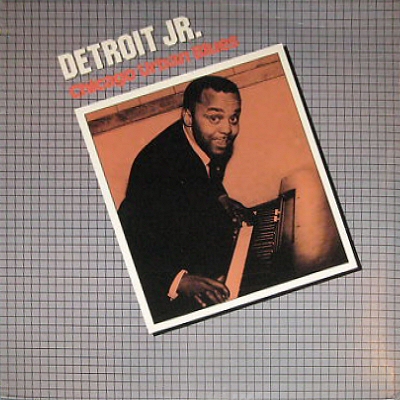
CHICAGO URBAN BLUES
Blues On Blues
Antilles
December 1971
Pianiste du groupe d'Howlin' Wolf entre 1968 et 1976, il trouve enfin l'opportunité de graver un disque complet sous son nom en 1971 grâce au producteur Al Smith et sa marque Blues on Blues. Detroit Junior livre ici un set de Chicago blues enlevé avec son chant de velours et un piano, somme toute, assez discret. Le groupe qui l'accompagne est de premier ordre : Mighty Joe Young (guitare), Little Mack Simmons (harmonica), Jimmy Richards (basse), Bill Warren (batterie). Young et Simmons sont, d'ailleurs, particulièrement en vue. L'ensemble est d'un très bon niveau mais on peut citer "Windy city blues", "Welfare blues", "Dance with my baby" et des reprises de ses vieux succès "So unhappy" et l'amusant "Call my job". Un disque assez court (moins de 30 minutes) mais qui vaut largement l'écoute. Celui-ci n'est disponible qu'en microsillon.
Pianist in the Howlin' Wolf backing band between 1968 and 1976, he finally found the opportunity to cut a full record in his own name in 1971 with producer Al Smith and his Blues on Blues imprint. Detroit Junior delivers a set of Chicago blues with velvet vocals and a quite discreet piano. The backing band gathers first-rate musicians : Mighty Joe Young (guitar), Little Mack Simmons (harmonica), Jimmy Richards (bass), Bill Warren (drums). Young and Simmons are, moreover, particularly brilliant. There are some great tracks such as "Windy city blues", "Welfare blues," "Dance with my baby" and covers of his old hits "So unhappy" and the funny "Call my job". A fairly short record (less than 30 minutes) but well worth listening. It is only available in LP.
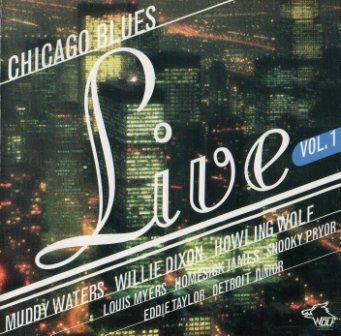
CHICAGO BLUES LIVE vol.1
Wolf
October 1978
Cette anthologie recueille des morceaux captés sur scène par Hannes Folterbauer. Detroit Junior y est présent sur quatre morceaux datant d'octobre 1978 : deux en leader, deux en tant qu'accompagnateur d'Homesick James. Malgré des conditions sonores passables, les titres s'écoutent avec plaisir notamment "Cool water blues" ou Detroit Junior imite Howlin' Wolf. On signalera, enfin, un morceau de 1973 ou Detroit fait encore partie de la formation de son mentor.
This anthology collects songs captured on stage by Hannes Folterbauer. Detroit Junior is present on four tracks dating from october 1978, two as a leader, two others as an accompanist of Homesick James. Despite passable sound conditions, those songs can be listened with pleasure most notably "Cool water blues" where Detroit Junior imitates Howlin' Wolf. It may be noted, finally, another 1973 track where Detroit is still part of his mentor's band.
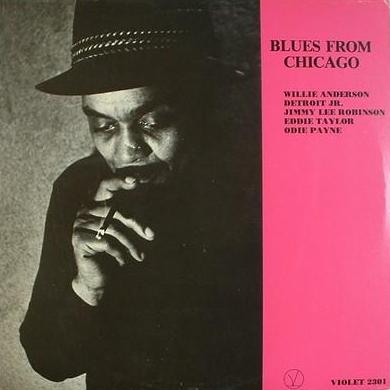
BLUES FROM CHICAGO
Violet
September 1979
Cette séance rassemblant divers bluesmen a été organisée par Edward Applebaum et Harold Brenner. Detroit Junior se montre bien peu inspiré sur les cinq titres très inégaux qu'il prend en leader.
This session gathering various bluesmen was organized by Edward Applebaum and Harold Brenner. Detroit Junior shows himself very little inspired on the five very uneven titles that he takes as a leader.
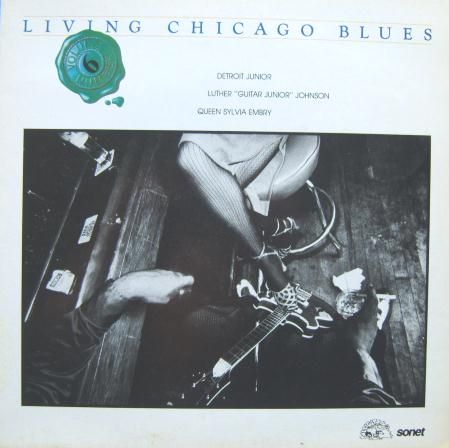
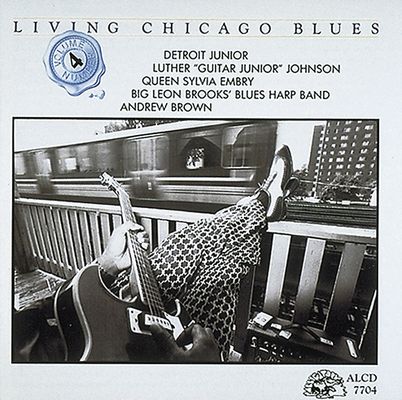
LIVING CHICAGO BLUES (LP vol.6 / CD vol.4)
Alligator
1980
Dans la magnifique série supervisée par Bruce Iglauer, Detroit Junior donne quatre morceaux ou il montre toute l'étendue de son inspiration et de sa verve. Très en forme, tout comme son groupe, il livre une prestation dynamique et accrocheuse, peut être sa meilleure sur disque : un très beau blues lent ("Somebody to shack") et l'irrésistible "I got money" (sorte de démarquage de son "Call my job").
In the magnificent series supervised by Bruce Iglauer, Detroit Junior gives four tracks where he shows all his inspiration and enthusiasm. In very good condition, like his backing band, he delivers a dynamic and catchy prestation, maybe his best ever recorded : a beautiful slow blues ("Somebody to shack") and the irresistible "I got money" (a derivative of "Call my job").
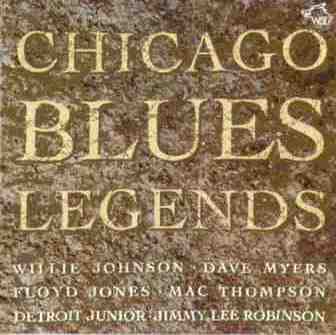
CHICAGO BLUES LEGENDS
Wolf
June 1994
A part un simple pour Reecy (le label de Maurice John Vaughn) en 1989, Detroit Junior n'avait plus rien enregistré depuis 1980 ! On se rend vite compte, à l'écoute de ses trois morceaux de 1994, que son talent et sa verve sont toujours au rendez-vous (il suffit d'écouter l'épatant "So unhappy").
Apart from a Reecy single (Maurice John Vaughn's label) in 1989, Detroit Junior had recorded nothing since 1980 ! We quickly realizes, listening to his 1994 three tracks, that his talent and verve are still present (just listen to the amazing "So unhappy").
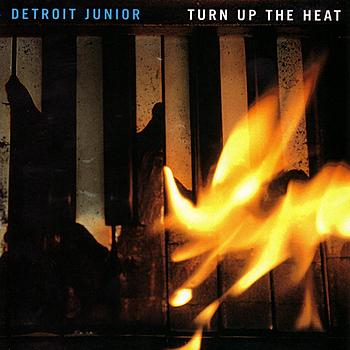
TURN UP THE HEAT
Blue Suit
1995
Premier disque pour Blue Suit, il est produit par Bob Seeman et John Rockwood et compte les participations de Freddie Dixon (basse) et Maurice John Vaughn (guitare, arrangements). Il s'agit d'un album très plaisant ou Detroit Junior se montre en forme et ses accompagnateurs attentifs et discrets. "Turn up the heat", "Boogie blues" et "Need more got to have" sont parmi les moments les plus réussis. Il rend aussi hommage à Howlin' Wolf ("Killing floor") et à Amos Milburn (un "Bad bad whiskey" assez moyen). L'auditeur attentif remarquera "Got high again" sorte de suite à "If I hadn't been high" présent sur l'anthologie "Living Chicago blues".
First record for Blue Suit, it is produced by Bob Seeman and John Rockwood with participations of Freddie Dixon (bass) and Maurice John Vaughn (guitar, arrangements). It is a very pleasant album where Detroit Junior is in great condition with an attentive backing band. "Turn up the heat", "Boogie blues" and "Need more got to have" are among the greatest tracks. He also pays tribute to Howlin' Wolf ("Killing floor") and Amos Milburn (a "Bad bad whiskey" pretty average). The attentive listener will notice "Got high again" sort of sequel to "If I hadn't been high" from "Living Chicago Blues" anthology.
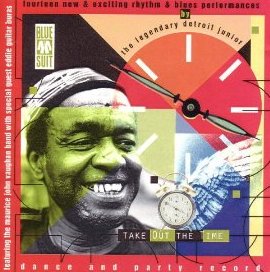
TAKE OUT THE TIME
Blue Suit
1998
Pour cet opus, on retrouve la même maison de disque et le même tandem de producteurs que dans la parution précédente. On retrouve aussi quelques musiciens comme Maurice John Vaughn, fidèle au poste. Au rayon des nouveautés, on note la collaboration d'Eddie Burns à l'harmonica. Outre "I got high last night", on remarque les reprises cuivrées de "Chicken shack boogie", "What I say", "I don't know". Dans l'exact prolongement du précédent disque mais la nouveauté en moins.
For this CD, we find again the same record label, the same tandem of producers than in the previous release and also some musicians like the faithful Maurice John Vaughn. As novelty, there is a collaboration of Eddie Burns on harmonica. Besides "I got high last night", we remark brassy covers of "Chicken shack boogie", "What I say" and "I don't know". In the exact continuation of the previous record but with less novelty.
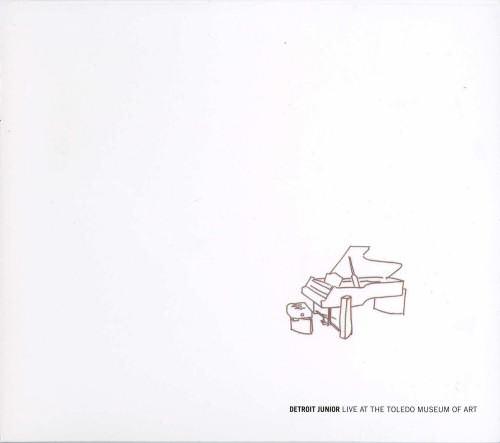
LIVE AT THE TOLEDO MUSEUM OF ART
Blue Suit
June 2001
Une couverture totalement blanche ornée d'un piano pour un disque ou Detroit Junior est capté sur scène seul à l'instrument. Sa belle voix expressive et douce est toujours au rendez-vous tout comme son jeu de piano relativement monolithique. L'artiste fait la part belle aux reprises avec plus ou moins de bonheur. Un peu ennuyeux par moments, il s'agit de son troisième et dernier disque pour Blue Suit.
A totally white front cover ornamented with a piano for a record where Detroit Junior is captured on stage alone with his piano. His beautiful and expressive voice is always effective as his sometimes monolithic piano playing. The artist covers a lot of standards with more or less success. A bit boring sometimes, it is his third and latest album Blue Suit.
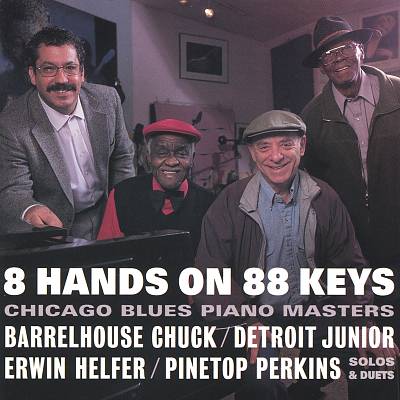
8 HANDS ON 88 KEYS
Sirens
November 2001
Pour célébrer les 25 ans du label The Sirens, quatre grands noms du piano blues de Chicago furent rassemblés : Pinetop Perkins, Erwin Helfer, Barrelhouse Chuck et, bien sûr, Detroit Junior. Ce dernier est présent sur cinq titres de cette anthologie : un duo avec Barrelhouse Chuck ("Miss Ida B"), un autre avec Erwin Helfer ("Ain't nobody's business" que Detroit Junior chante parfaitement) et trois morceaux en solo (dont un voluptueux "Ella").
To celebrate 25 years of The Sirens label, four piano blues greats of Chicago were gathered : Pinetop Perkins, Erwin Helfer, Barrelhouse Chuck, and, of course, Detroit Junior. The latter is present on five tracks in this anthology : a duet with Barrelhouse Chuck ("Miss Ida B"), another with Erwin Helfer ("Ain't nobody's business" which Detroit Junior sings perfectly) and three solo pieces (including the voluptuous "Ella").
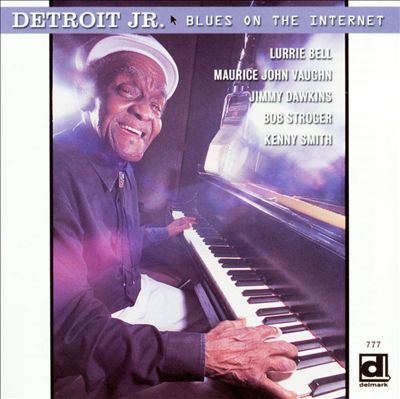
BLUES ON THE INTERNET
Delmark
August 2004
Bien entouré par des musiciens chevronnés (Maurice John Vaughn, Jimmy Dawkins, Lurrie Bell, Bob Stroger, Kenny Smith et une petite section cuivres composée d'Eric Schneider et Sonny Cohn), Detroit Junior, 73 ans au compteur, propose un sympathique programme de Chicago blues. Plusieurs excellents moments parsèment ce disque : "Rockin' after midnight" (reprise à Lowell Fulson), le superbe blues lent "Blues on the internet", "Hot pants baby", "Which one of us you want to please", "Money crazy" mais il n'y a pas grand chose à jeter ici.
Although surrounded by experienced musicians (Maurice John Vaughn, Jimmy Dawkins, Lurrie Bell, Bob Stroger, Kenny Smith and a small brass section composed of Eric Schneider and Sonny Cohn), Detroit Junior, 73 years old, offers a nice program of Chicago blues. Several excellent moments : "Rockin' after midnight" (a Lowell Fulson cover), the superb slow blues "Blues on the internet", "Hot pants baby", "Which one of us you want to please", "Money crazy" but there is not much to throw here.